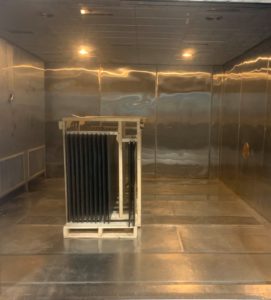Heat Aging Testing
Heat aging testing services offered at material testing Micom Laboratories. It is often necessary to predict the safe storage period or working life of plastic and polymer components at the design or pre-production stage.
Heat aging is used in a lot of test methods including:
- ASTM C771
- ASTM C792
- ASTM C1246
- ASTM C1522
- ASTM D572
- ASTM D1573
- ASTM D3045
- ASTM D6491
- ASTM D7444
- ASTM F1980
- ASTM D7912
Heat Aging Testing
 The most commonly accepted way of doing this is to perform heat aging testing on either the component or a test sheet of the same composition in the chosen environment at higher temperatures and fitting the results where possible to an Arrhenius expression:
The most commonly accepted way of doing this is to perform heat aging testing on either the component or a test sheet of the same composition in the chosen environment at higher temperatures and fitting the results where possible to an Arrhenius expression:
k (rate of change) = A exp (-E/RT)
where E = activation energy
A = pre-exponential factor
T = absolute temperature
R = gas constant
In layman’s terms, Heat aging testing is based on the fact that any chemical reaction will double its speed with each 10 °C increment. There is a limit, however, to increasing the conditioning temperature as some chemical reactions will never occur in a product’s life environment but, might start happening at much higher temperatures because we give this “abnormal” chemical reaction sufficient activation energy.
Typically, for products normally being used at temperatures close to 25 °C, a standard test temperature will be 65 °C. In that case, a time compression factor of 16 would be assumed. This means that the product conditioned at 65 °C is 16 times older than the same product maintained at 25 °C for the same duration.
This widely spread test will often be done in conjunction with physical and mechanical measurements such as tensile properties, color, gloss, abrasion resistance and many other test methods allowing to quantify the aging process on a scale that suits your specific application.
Heat aging testing can also be done by compounding its effects with other deleterious parameters such as UV Testing or Corrosion Testing. In some cases, temperature variations with or without relative humidity will also prove to have more deleterious effects. For more information please read about our Thermal and Humidity Cycling or Thermal Shock Testing services.
If you have any questions about heat aging testing, we invite you to contact our material testing lab today. It will be our pleasure to help you identify what should be the proper accelerated aging test method to apply to your product based on your specific needs. Our material testing experts will be happy to help with your heat aging testing needs or any other custom aging technique you might require.
Other Related Test Methods to Heat Aging
For additional test methods related to heat aging testing, we invite you to read more about Plastics, Test Chamber or Accelerated Aging, Coating Testing and Polymer Testing.
We also invite you to download our brochure to learn more about our Paint, Coating and Polymer testing services.

